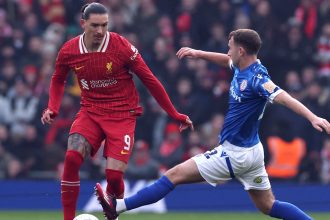It is the weekly source of supporters' pain: why is my team never first on Match of the Day? There are calls of widespread bias and favouritism aimed at those who decide which Premier League teams get the most airtime each weekend – but how is the Match of the Day running order really decided, and does it favour any teams at all?
Here, we delve into how each episode comes into being and what factors are considered when putting the schedule together.
When did Match of the Day start?
Match of the Day first aired in 1964 – 60 years ago this August. Back then, only one game was shown, with almost an hour's worth of highlights of a clash between Liverpool and Arsenal the show's first-ever match.
Evolving over the decades to show highlights of every weekend Premier League game, Match of the Day has continuously shown Premier League coverage since 2004, having regained the rights from ITV following a three-year period where the BBC was restricted to FA Cup games and England internationals.
2004 also saw the birth of Match of the Day 2, which showcases the Sunday action as well as a recap of the weekend.
When is Match of the Day on TV?
Match of the Day typically airs on BBC One on Saturdays at 10.30pm, with Match of the Day 2 starting at the same time on Sundays, except during international breaks.
Episodes are made available to live-stream on BBC iPlayer, and are able to view for 7 days from midnight on the day of a broadcast. There is a repeat of the main show on Sunday mornings.
If there are six or more midweek matches in the Premier League, there will also be a midweek edition of MOTD, usually on a Wednesday evening.
Micah Richards' net worth, girlfriend, haircut, retirement, age, salary, book
FFC takes a look at Micah Richards, his career and his life after football.
ByJack Salveson HolmesNov 5, 2023 How the MOTD running order is decided
There are a number of factors that determine the running order each week. Ultimately, the decision lies with the programme editor (not Gary Lineker). The quality of the game, importance of the match, or even the amount of goals are all taken into account.
Lineker has commented on the decision-making process in the past, explaining that while there is a tendency to show the title favourites in the second half of the season, the biggest stories are what dictate the order to a greater extent. He has also said that draws are less likely to feature first, with winning outcomes often preferred.
Speaking last September, he said (via The Mirror): "We put Forest beating Chelsea 1-0 on second on Saturday night, ahead of Manchester City scoring five [against Fulham] because it is a big story… You take all those things into account."
Last year, he tweeted the average running order positions for teams in the 2022/23 campaign, with teams at the top and the bottom featured more towards the start of the show, while mid-table sides – including Chelsea – often towards the end.
However, it was interesting to point out that each team was on first at some point during the season, while the order "generally correlates to [the] number of goals in a game". This clearly shows that it is always possible for any game to lead MOTD on a given weekend – but more chaos and goalmouth action may be required depending on where you are in the table.
Will this quell fans' dissatisfaction over the running order? We doubt it. But there is a clear rationale and method behind it every week. Will your side lead it on the opening weekend?









